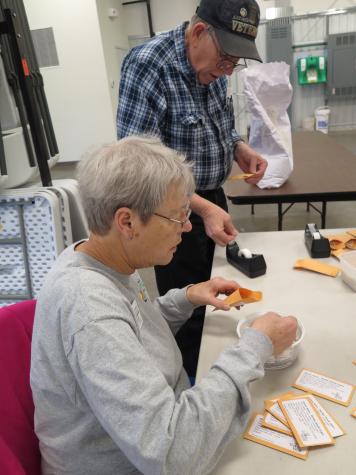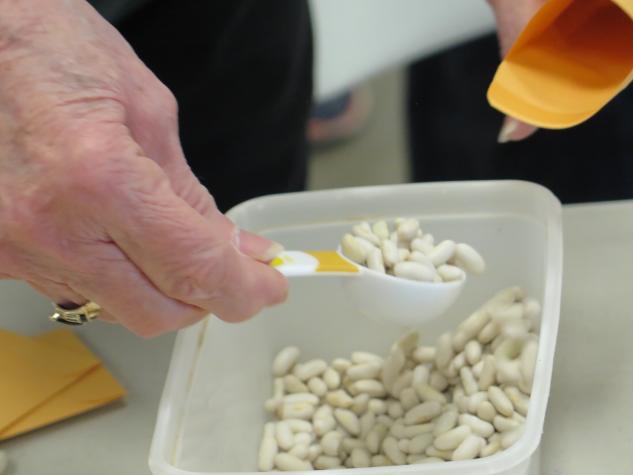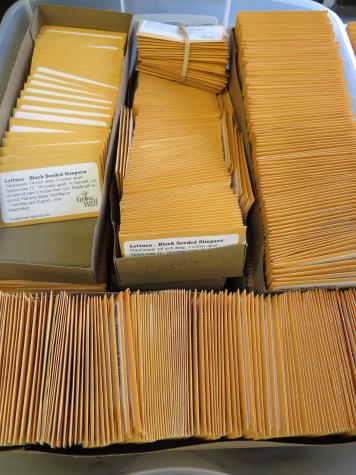MEXICO, Mo. – University of Missouri Extension Master Gardeners and Grow Well Missouri partner to plant seeds of hope in food pantry clients at Mexico’s Help Center.
Food pantry recipients plant community garden plots with seeds bought in bulk and packaged by Master Gardeners and community volunteers. Master Gardeners also provide tools, supplies and advice.
The motto of the Master Gardener program is “helping others learn to grow,” said MU Extension horticulturist David Trinklein. “I can think of few applications of the Master Gardener program more beneficial than assisting those in need to grow their own food.”
Master Gardeners teach growers how to garden and use the food in meals.
Sixteen Missouri communities, including Mexico, participated in the Grow Well program last year. The program is in its fifth year.
Grow Well Missouri partners with food pantries to fight health problems with healthy food. MU research shows diabetes, hypertension and high cholesterol occur more often in households with food insecurity.
Community gardens bring groups together
The garden is just one part of the community food system, said Bill McKelvey of MU’s Interdisciplinary Center for Food Security. He calls it a “matchmaking program” that brings food pantry clients and volunteers together to build a stronger community.
Garden produce adds flavor and nutrition to meals. It also helps food stamp dollars go further. But it’s more than that, McKelvey said.
Gardeners take pride in doing something for themselves, he said. They like socializing and learning. Volunteers enjoy teaching the lost art of gardening to food pantry clients. McKelvey’s data shows 90 percent of participants share produce with others.
Barriers to gardening
Apartments often lack garden spots and renters tend to move often, McKelvey says. Audrain County Master Gardeners and volunteers work together to open gardens on city-owned land. They also offer “Garden in a Bag” and patio pots for those who lack a garden spot or transportation to a community garden.
More than 15 percent of Audrain County is food insecure
According to the 2014 Feeding America report, 15.6 percent of Audrain County residents fear running out of food monthly. Another 7.3 percent report they experience hunger at times.
Food pantries and programs like Buddy Backpacks and Women, Infants and Children (WIC) stretch food stamp dollars. Community gardens add another layer of protection.
Health and food insecurity go hand in hand
MU research shows income levels, food insecurity and diet-related health conditions go hand and hand.
Obesity rose in Missouri to 30.2 percent, according to the 2016 Missouri Hunger Atlas. More than 37 percent of Audrain County residents are obese. The county’s rate of hypertension is 45.9 percent, compared with the statewide average of 34.3 percent.
Stereotypes picture the hungry as frail and thin. However, many deal with the challenges of being overweight. They stretch food budgets with high-calorie foods that are often cheaper and less perishable than fresh fruits and vegetables.
About half of food pantry clients have to choose between paying for essentials such as rent and medicine or food, according to MU’s Regional Profile of Missouri Food Pantry Clients and Households report.
Hungry elderly numbers grow
The face of hunger is changing.
McKelvey said data shows working individuals and families, elderly and the disabled often struggle to make ends meet. Temporary circumstances such as reduced work hours, often weather-related in Missouri, may send them to the food pantry.
Increasingly, Missouri’s elderly lack enough food.
More than half of the Mexico food pantry’s clientele is over age 50. The Missouri Foundation for Health 2015 report states that food insecurity among older adults more than doubled between 2001 and 2011.
Resources exist to meet needs
While those who are poor in Mexico face challenges, they also have access to community resources that others in the state do not have.
Mexico’s Help Center, which moved to a new location in July 2015 after the community raised $1.2 million, is a one-stop shop for in the area. In addition to the food pantry, there is a thrift store, and Job Corps and Central Missouri Community Action offer job fairs and career classes at a central location.
Help Center director Phillip Iman and volunteers also find resources outside of the community. A Wal-Mart grant provided a well to water community gardens.
USDA has provided grants, including one for a high tunnel to extend the growing season. FFA members also use it as a learning tool. The high school building trades class built a shed to hold garden tools. FFA members and Callaway Fields nursery in Auxvasse donated tomato plants.
Community Action Coalition, Audrain County Health Department and the city of Mexico are active partners in making sure that no resident goes hungry. All students in Mexico elementary schools receive free breakfast and lunch. Buddy Packs tide them over on weekends.
Food pantries in Audrain County gave out more than 854,744 pounds of food in 2015.
Up to 180 volunteers help at the food bank. Many more work at gardens, in the thrift store and in other ways to help lift people out of poverty.
For more information about how MU helps fight food insecurity, go to foodsecurity.missouri.edu.
Grow Well Missouri is supported by a host of additional partners, including the MU Health Communication Research Center, the Food Bank for Central and Northeast Missouri, MU Extension, local Master Gardener and Garden Club groups, and Feeding Missouri.


